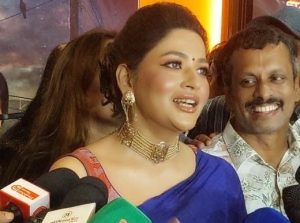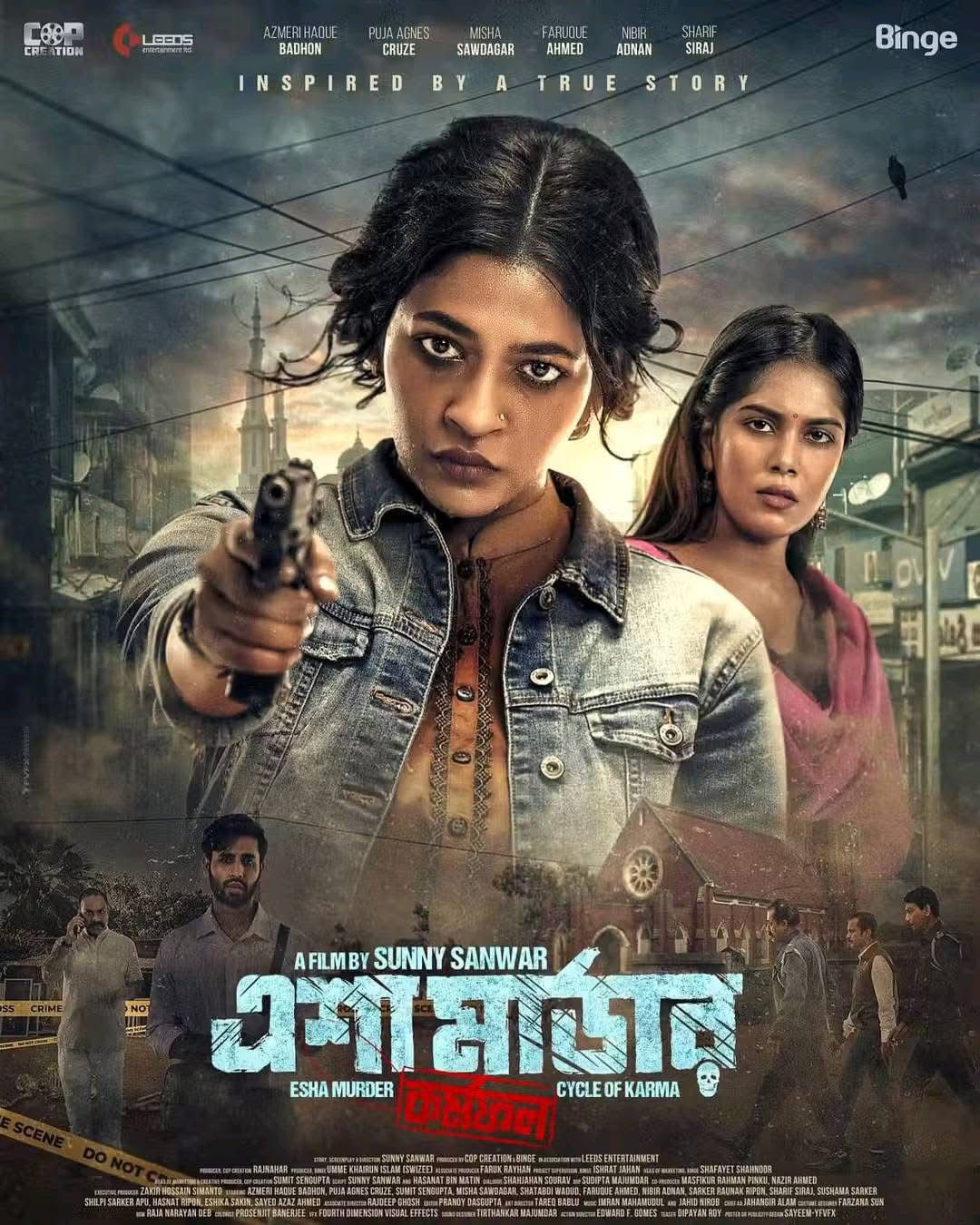Sunny Sanwar’s Esha Murder: Karmofol is not just another entry in Bangladesh’s growing list of crime thrillers—it’s a bold detour from the predictable. Refusing the tropes of melodrama and excess, the film investigates not only a murder, but the social and emotional violence that breeds it. What unfolds is a gripping, slow-burn procedural that is as much about internal decay as it is about solving a brutal crime.
At the center of the film is Leena, a recently transferred female police officer portrayed by Azmeri Haque Badhon in a stunningly grounded performance. Her introduction isn’t through heroics, but quiet observation—her first case unfolds as a young woman named Esha (played by Agnes Puja Cruze) is found murdered, her body grotesquely mutilated. The town is shaken, the headlines scream, and somewhere in the margins, Leena begins piecing together what happened—not with cinematic genius, but with the methodical burden of a public servant carrying scars of her own.
What’s exceptional about Sanwar’s direction and screenplay (also co-written with Hasanat Bin Matin) is how it lets Leena break the mold of the all-knowing detective. She is vulnerable, sometimes afraid, often unsure, and constantly underestimated by her male colleagues. Her moments of physical weakness—vomiting after seeing Esha’s corpse, or breaking down after an emotional confrontation—are never framed as flaws, but as signs of humanity. And that’s the heart of this film: peeling away the performance of power to reveal something disturbingly real underneath.
Sanwar, also a real-life police officer, brings procedural authenticity without overloading the film with jargon. His pacing is deliberate; the investigation is messy, slow, and frustrating, mirroring how justice actually works—or fails to. We meet a lineup of suspects: a volatile mechanic (Sharif Siraj, as the suspicious and unpredictable Nasir, brings a kind of quiet menace that keeps us on edge.), a repressed boyfriend (played ably by Nibir Adnan), a lecherous landlord (sharp turn by Shatabdi Wadud), and a string of morally ambiguous men who all reflect different shades of complicity.
But the most chilling presence is Syed Azaz Ahmed, who with very little screen time and barely a word spoken, manages to dominate the film’s tone. His cruel smirk does more damage than most villains’ monologues. It’s a performance that haunts without ever announcing itself.
Where the film truly distinguishes itself is in its aesthetic and craft. There’s no artificial gloss. Cinematographer Sudipta Majumdar captures a dusty, desaturated world—where village roads look dry and cracked, police stations feel neglected, and even dawn arrives with a touch of dread. The art direction by Tareq Bablu reinforces this realism with subtle visual cues—old calendars, rusted furniture, stained walls that haven’t seen paint in years. Even the uniforms feel worn in, not costumed.

The costume design by Farzana Sun is refreshingly understated. Leena’s clothing choices are utilitarian, weathered, sometimes mismatched—she dresses like someone who doesn’t have time to care about appearances. Villagers wear what they would actually wear. It might seem minor, but it speaks volumes about the film’s commitment to authenticity.
Prosenjit Banerjee’s color grading sticks to a muted, emotionally drained palette. Even lush village scenes are rendered dry, beige, and washed-out—suggesting a moral decay that’s leached into the land itself. The visual tone perfectly supports the narrative weight.
Equally effective is Mrinmoy Sanyal’s background score. It doesn’t demand attention, it listens instead. Sparing, ambient, sometimes unsettling, it accentuates dread without theatrics. At key moments, the film opts for silence instead of sound, making the viewer sit with discomfort. The song “Bondi Shudhu Jane Mukto Howar Mane” echoes the core theme with poetic accuracy—it’s not freedom that’s fought for here, it’s the right to not be forgotten.
The supporting cast is solid throughout. Sushama Sarker, Shilpi Sarker Apu, Hasnat Ripon, and Sumit Sengupta fill in their roles with just the right doses of realism and restraint. In particular, Misha Sawdagar—as a local bakery owner—blends effortlessly into the ensemble, though his voice being dubbed by someone else is an odd directorial choice that slightly breaks the immersion.
The film’s social undercurrents are impossible to miss. Sexual harassment in schools, domestic abuse, and the long-term psychological cost of neglect and toxic masculinity are woven into the plot without being reduced to message-mongering. The idea of karmic justice—why the film is titled Karmofol—emerges in the final act, delivering a brutal and morally ambiguous twist that lands like a slap. Here, revenge and justice bleed into each other. And nature, perhaps, takes what institutions cannot.
Still, not everything works perfectly. Some explanations—such as a disturbing trend of crimes linked to Valentine’s Day—feel underdeveloped, even rushed. And while the flashback structure adds intrigue, a tighter editorial rhythm could’ve helped early segments feel less repetitive. But these are minor in the face of the film’s overall achievement.
What Esha Murder: Karmofol ultimately delivers is a murder mystery that doesn’t fetishize violence, doesn’t glamorize cops, and doesn’t talk down to its audience. It trusts the viewer to observe, to feel, and to judge. In a cinematic landscape where women are too often reduced to victims or love interests, here is a female character who carries the entire film on her bruised but unbending shoulders.
Badhon returns to the big screen with full force. Sanwar establishes himself not just as a skilled craftsman, but as a filmmaker with something to say—and the restraint to say it well.
Credits
Esha Murder: Kormofol is written and directed by Sunny Sanwar, with dialogues by Shahjahan Sourav and co-written by Hasanat Bin Matin. The film stars Azmeri Haque Badhon, Puja Agnes Cruze, Sumit Sengupta, Misha Sawdagar, Shatabdi Wadud, Faruque Ahmed, Nibir Adnan, and Sarker Raunak Ripon, with Sushama Sarker, Shilpi Sarker Apu, and Hasnat Ripon in strong supporting roles. Cinematography is by Sudipta Majumdar, editing by Pronoy Dasgupta, background music by Mrinmoy Sanyal, and art direction by Tareq Bablu, Ahmed Humayun, and Jahid Nirob. The costume design is by Farzana Sun, and sound design by Tirthankar Majumdar. The film is produced by Md Masfikur Rahman and Faruk Rayhan, in association with Cop Creation, Binge, and Leeds Entertainment.
Abu Shahed Emon, Filmmaker


